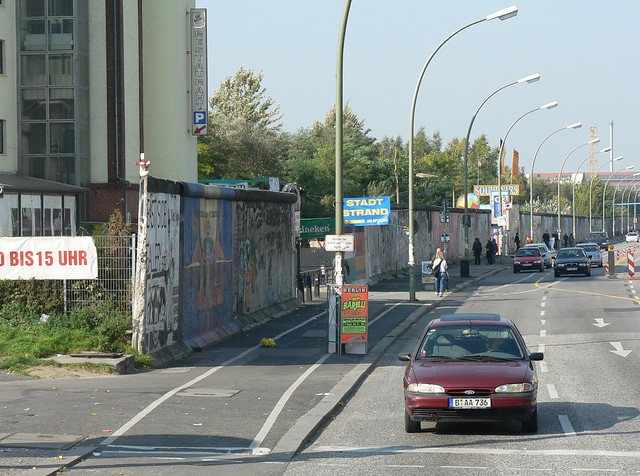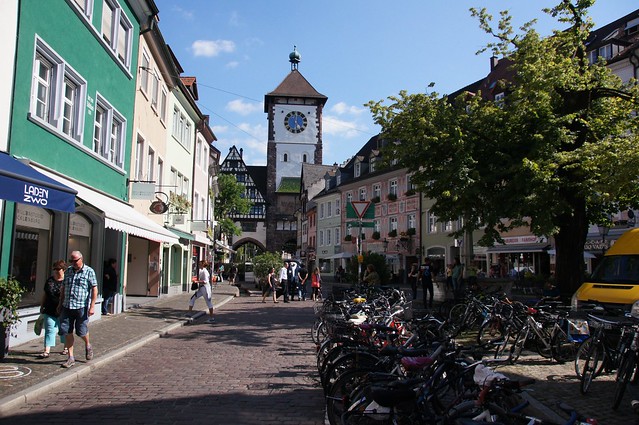Tips for foreign exchange students in Germany
Students going on exchange to Germany have many things to look forward to. On the whole, Germans are friendly, open-minded and surprisingly funny. Germany itself is a land of great diversity, with landscapes including alpine high country, deeply-wooded forests, and picturesque valleys (such as the famous Rhine Valley). Germany also has many rich cultural traditions, and in many ways is still at the cutting edge of music and the arts.
In short, Germany is a great student exchange destination. I liked it so much that I did two university exchanges there. Here’s what I learned:

Language
Germany’s official language is German. Germans speak a range of different dialects. However, the purest German is known as “High German” (Hochdeutsch). High German is the dialect which is most commonly used for TV and radio broadcasts, and should be the dialect which your teachers used if you’ve previously taken German language lessons. Instruction at your German school should also be in High German, even if the local dialect is different.
The dialects spoken in some parts of Germany – particularly in Bavaria, Baden, and the former states of East Germany – can be difficult to understand at first. However, they aren’t radically different from High German, and you’ll adjust to them quickly.
After returning from my exchange to Germany, I taught German to adults at night school for seven years. My number one tip for learning German is to spend as much time as possible learning the grammar, with the aid of a book like Schaum’s Outline of German Grammar. You’re welcome.

High School
Like many other European nations, Germany streams high school students depending upon students’ planned career paths. Usually the different streams are as follows:
- Students who intend studying at university go to a type of school called a Gymnasium
- Students who will undertake clerical careers – working in banks, or in sales – attend a type of school known as a Realschule
- Students who will study a trade or perform manual work go to a type of school known as a Hauptschule
Depending upon your own future career plans and level of German language proficiency, you’ll most likely attend a Gymnasium or a Realschule. Incidentally, don’t feel that you’ve been short-changed if your exchange organisation arranges for you to attend a Realschule. The students there are typically more relaxed and should have more time to socialise than students who attend a Gymnasium.
Attire
German high school students don’t usually wear school uniforms or need to observe a school dress code. Note that, like many other Europeans, German students typically dress in dark colours, especially in the Winter months.
Co-curricular activities
Some German schools offer co-curricular activities such as team sports, band or choir. However, it’s more common for young Germans to participate in those activities in local Vereine (clubs), rather than as part of school. If you want to participate in such activities while you’re on exchange, check with your host family when you arrive and ask them to help you get organised.

Social etiquette (a.k.a. what Germans like, and what they don’t like)
Germans have a reputation for being stiff and formal. In my experience, that reputation is ill-deserved. Young Germans, in particular, are quite laid-back, have a good sense of humour, and are generous and open-minded.
World War 2
Germany’s actions in World War 2 – particularly its role in perpetrating the Holocaust – are a continuing source of shame and embarrassment for many modern Germans. Germans are determined not to forget Germany’s part in Word War 2 and believe that being mindful of the past will prevent them from repeating the same mistakes in future. However, this determination at times goes too far and becomes a kind of morbid fixation on the past. As a result, many German high-school students today still feel personally responsible for the Holocaust, even though, in most cases, those events took place even before their grandparents were born.
For a high-school exchange student in Germany, the safest and most tactful approach when it comes to World War 2 is to avoid mentioning it. If someone else brings it up in conversation, don’t dwell on it. Never, ever joke about it. If someone asks you your opinion on Germany’s role in the war, or what you think about Nazism, just say that it was a long time ago, and that you find it hard to believe that any modern German would do such things.
Religion
By Western standards, Germany is still a religious country. For example, many Germans still voluntarily donate 10 per cent of their wages to the Catholic or Protestant church. Most people still consider themselves religious, even if they don’t go to church regularly.
What this means in practice is that you will need to avoid exclamations such as “God!” or “Jesus!”, as these may offend people. If you aren’t religious yourself, avoid talking negatively or skeptically about religion, or religious holidays or practices.
Formal and informal
In common with many European languages, German has formal and informal ways of addressing other people. Although people will make allowances for someone who’s clearly a foreigner and unused to the language, addressing someone informally, when you should be using formal language, can be considered rude.
The basic rule of thumb when speaking German is that you only address the following groups using informal (du) language:
- Children
- Relatives
- Animals
- Friends
- Things
In all other cases, you should use the formal (Sie). Where you aren’t sure about whether to address someone using formal or informal language – for example, because they’re an adult friend of your host family whom you’ve only just met – it’s safest to use formal language.
Neatness, order, hard work
A final cultural note is that Germans value neatness and orderliness very highly. In practice, this means that your host parents may expect you to keep your room and belongings neater than you are used to at home. They may also be strict about things like ensuring that your dirty clothes are the right way out (not inside-out) when you put them out to be washed.
Germans also have a very strong work ethic. This may mean that your host parents will expect you to demonstrate that you are working hard at school and/or at learning German. Indeed, they may say something if they don’t think you’re working hard enough. (Pro tip: doing your homework or language learning at the kitchen table or other visible place in your host family’s house is a good way to demonstrate that you are working hard).
Money management
Germany has a well-developed banking sector. There is usually at least one bank in every town, and ATMs are widespread. Your host parents will help you to sort out a bank account soon after your arrival.
In common with most other parts of Europe, Visa cards and Mastercards are widely accepted by German shops, as well as all post offices, train station ticket offices, and so on. Fewer shops accept American Express, Diners’ Club and other cards. So, if you are planning to take a credit card with you on exchange to Germany – which I recommend – go with a Visa or Mastercard.

Cost of living
When it comes to other expenses, you needn’t worry – by Western European standards, Germany is an inexpensive place to live. Germany’s post-World War 2 economic miracle was built on the back of fierce competition between German firms trying to find better and more efficient ways to serve their customers. As a result, it’s possible to live quite cheaply in Germany. Entertainment items (music, DVDs, books) are reasonably priced. Name-brand clothing can be harder to find than in the US or Australia, but is also usually well-priced when you do track it down. Phone credit is relatively inexpensive in Germany.
Getting around
Most German students get around using a combination of bike and public transport, and it’s likely that you will, too. Because Germany is a densely-populated country, this combination of bike, trains and buses should enable you to see and experience a great range of things in your local area.
The German federal railways (Deutsche Bahn, or DB for short) offer clean and efficient transport between major cities. No matter how small your host town is, trains should go to the nearest big city at least once per hour. Major rail hubs such as Munich, Frankfurt and Cologne have several services daily to other major European cities. Be warned that it’s usually mandatory to reserve a seat on long-distance trains.
Larger German cities usually have their own Stadtschnellbahn (S-Bahn) urban train networks, with connections every few minutes to other parts of the network. It’s usually possible to purchase a daily, weekly or monthly ticket giving you unlimited travel on these networks. Your host family or exchange organisation may subsidise or even fully fund the purchase of your monthly ticket.

German food
German food has a reputation for being stodgy and heavy. Things like sausages, potato and dumplings still form an important part of the German diet. However, like everyone, Germans have embraced cuisine from all over the world. Accordingly, it’s likely that your host family will serve pasta, pizza, French fries, and many of the same foods you eat at home.
Vegetarianism and veganism are widely practised in Germany and your host family should be able to cater for you if you don’t eat meat and/or dairy products.
If you feel like eating out, you’ll find Chinese, Indian, Turkish and Italian restaurants and take-aways pretty much everywhere. The usual fast-food suspects (McDonalds, Burger King, Pizza Hut, Subway) also have a presence in all major German cities.
If you’re out somewhere and need a snack or a cheap lunch, there are a wide range of German supermarkets offering chocolate, baked goods, pre-packed sandwiches and rolls, and so on, at rock-bottom prices. Aldi, Lidl and Penny are the biggest discount chains. There are also bakeries all over the place – Germans make great bread, croissants and pastries, so these are a good option.
German culture
Music
Germans produce and listen to almost every kind of music you can think of – from jazz, to hip-hop, to heavy metal, to classical. Germans also basically invented “boy-band” music and techno. No matter what your taste in music, you’ll be able to purchase it or see it live while you’re on exchange in Germany.
German free-to-air radio is also surprisingly good. Most of the songs which are popular in the English-speaking world are also popular in Germany, and German radio also plays some popular German, French and Italian-language songs. As noted in my article on language learning, listening to the radio is also an excellent, cheap way of improving your language skills.
Other fine arts
Germans value the other fine arts very highly. Consequently, even many smaller German towns have their own theatres, orchestras and art galleries. Your German high school may also offer theatre and art courses which you can participate in.
Sport
Sport plays a big part in German life. The most popular spectator sports in Germany are soccer in the summer months, and snow sports in Winter. Germans participate in virtually every sport possible, so if you currently play a sport at home and want to keep it up while you’re on exchange, this should be possible.

Communications
As a modern, affluent society, Germany has excellent telecommunications infrastructure. Your host family should have access to fast broadband and there should be no issue with you accessing their WiFi network. Your host parents should also be able to help you organise a SIM card for your cell phone upon your arrival in Germany. Cellular phone services in Germany are fast and offer virtually universal coverage.
Where to go
Your exchange organisation may not enable you to choose where in Germany you go on exchange. If you do have a choice, however, I recommend the Southern states – Baden-Wuerttemberg and Bavaria. Generally, these are the warmest parts of Germany, are very prosperous, and are centrally located within Europe. For example, my former home town of Freiburg in Baden-Wuerttemberg is only two hours by train from Zurich, an hour and a half from Strasbourg, and five hours from Milan.
Having said that, there are great things about living in most parts of Germany. Living in the Rhein-Ruhr region (around Cologne, Dusseldorf, Essen and Dortmund) gives you access to dozens of major German cities (and consequently, lots of museums, galleries, shops, concerts and sporting events), as well as easy access to the Netherlands and Belgium. Living in the former states of East Germany enables you to experience the history of those areas and witness their renaissance.
If you’re planning to go to Germany as an exchange student, my book How to Have a Successful High School Exchange contains lessons and advice from my own time on exchange which will help to ensure that your exchange is a success.
Best of luck during your time in Germany.
Kind regards,
Matt



